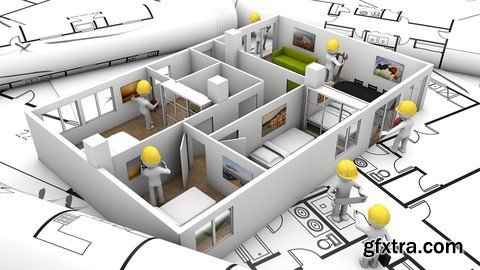
Space Planning In Interior Design
Published 5/2023
MP4 | Video: h264, 1280x720 | Audio: AAC, 44.1 KHz
Language: English | Size: 3.59 GB | Duration: 4h 41m
What you'll learn
Designing an ergonomic residential space
Working with criteria matrix
Working with bubble diagrams
Developing a furnished floor plan
Furnishing a floor plan based on residential space standards
Requirements
Printable (Found in the resources) : CRITERIA MATRIX AND ADJENCECY-Model, Floor Plan.
Tracing papers, Sticky notes, black marker, 2 colored markers, black ink pen, circular templates ruler (optional), triangle ruler, masking tape.
Description
Space planning is a fundamental aspect of interior design that directly influences the functionality, flow, and overall aesthetic appeal of a space. In this course, participants will explore the principles, techniques, and strategies of effective space planning in interior design. Through a combination of theoretical concepts and a practical exercise. Participants will develop the skills needed to create well-organized, efficient, and ergonomic interior spaces.This course is divided into 3 sections: Section 1: We will start by understanding the scope of the project. Elaborating the 5 steps to approaching a project: starting with meeting our clients all the way to executing our project.Section 2: I believe that the best way to learning is through practice, for this reason I will explain space planning with an exercise, you have the choice to either watch the process and practice afterwards, or you can grab the materials listed and work along. Hands on we will work step by step to plan efficiently our interior residential space:Begin by thoroughly examining the space we're working with.Determine the purpose of the space and identify the specific activities that will take place within it.Divide the space into different zones based on their intended use. Assess the plan from different perspectives and make adjustments as necessary. Consider how the space plan aligns with the client's requirements and preferences. in this section we will get very close to the final outcome and we will reach 70% of our final plan. Only furniture setup would be missing but would be completed by the end of this course.Section 3: (divided into 5 lectures) we will go deeper and understand the standards of anthropology in interior design through the standards of furnishing in specific rooms covering all of the following objectives.Lecture 1: bathroom standards and circulationsLecture 2: bedroom standards and dimensionsLecture 3: kitchen standards and circulationsLecture 4: Living room standard and circulationsLecture 5: Dining room standard and circulations By the end of this course, participants will have a comprehensive understanding of space planning in interior design. They will possess the skills and knowledge to analyze space requirements, develop efficient floor plans, create functional zones, incorporate design elements and principles, and effectively communicate their ideas. Whether pursuing a career in interior design or simply seeking to improve their own living environment, participants will be equipped with the tools to create well-designed and thoughtfully organized interior spaces. Are you brave enough to start? Join me now and let’s master the interior design profession.
Overview
Section 1: 5 Steps to approaching a project
Lecture 1 Interior design project approach and execution
Section 2: Creating a floor plan - Hands on -
Lecture 2 Reading the floor plan and working with criteria matrix
Lecture 3 On Paper
Lecture 4 Partitioning (Bubble Diagram & Block Diagram)
Lecture 5 On Paper
Section 3: Space planning - Room by room guideline -1- Bathroom
Lecture 6 Bathroom types, clearances and standard dimensions
Lecture 7 Bathroom appliances and characteristics
Lecture 8 Design approach for bathroom layouts
Lecture 9 Designing a bathroom floor plan: on paper analysis
Section 4: Space planning - Room by room guideline -2- Bedroom
Lecture 10 Bedroom types, standard dimensions and clearances
Lecture 11 Types of bedroom furniture, dimensions and characteristics
Lecture 12 Bedroom closet design
Lecture 13 Designing a bedroom floor plan: on paper analysis
Section 5: Space planning - Room by room guideline -4- Kitchen
Lecture 14 Modular kitchen layouts and dimensions
Lecture 15 Kitchen circulation and cabinet standards
Lecture 16 Main kitchen appliances and specifications
Lecture 17 Kitchen island and seating standards
Lecture 18 Designing a kitchen floor plan: on paper analysis
Section 6: Space planning - Room by room guideline -3- Living room
Lecture 19 Living room shapes and dimensions
Lecture 20 Types of living room furniture
Lecture 21 Living room clearances and circulation
Lecture 22 Furniture layout
Lecture 23 Designing a living room floor plan: on paper analysis
Section 7: Space planning - Room by room guideline -5- Dining room
Lecture 24 Dining room standard dimensions
Lecture 25 Dining room furniture choice and dimensions
Lecture 26 Clearance and circulation + How to Choose the Correct Table Size for Your Room
Lecture 27 Designing a dining room floor plan: on paper analysis
Section 8: Closure
Lecture 28 Thank you note
Beginners in Interior design, interior design enthusiasts and decorators.
Top Rated News
- MRMockup - Mockup Bundle
- Finding North Photography
- Sean Archer
- John Gress Photography
- Motion Science
- AwTeaches
- Learn Squared
- PhotoWhoa
- Houdini-Course
- Photigy
- August Dering Photography
- StudioGuti
- Creatoom
- Creature Art Teacher
- Creator Foundry
- Patreon Collections
- Udemy - Turkce
- BigFilms
- Jerry Ghionis
- ACIDBITE
- BigMediumSmall
- Boom Library
- Globe Plants
- Unleashed Education
- The School of Photography
- Visual Education
- LeartesStudios - Cosmos
- Fxphd
- All Veer Fancy Collection!
- All OJO Images
- All ZZVe Vectors




 Categories
Categories







